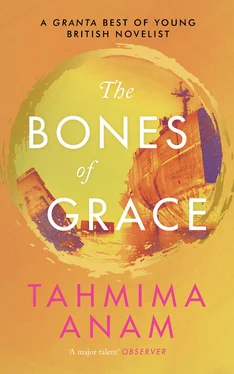My first look at this scene made me profoundly sad. Or, rather, it took the sadness that already existed within me and magnified it. I felt I was made of something unmalleable, something hard and alien. It took me time to realise what I was really mourning, and perhaps I am only coming to an understanding of it now, all these years later. It was the pregnancy, of course. I hadn’t reckoned with my need to be of the same blood as another person — I had never thought about that before, and being presented with the possibility, and having that possibility taken away, made my longing acute in the multiplied hit of a desire for something that is a new, but also very old.
But more than that, I recalled the initial feeling of bitterness when I saw those two blue lines and realised that it wasn’t that I didn’t want a baby, it was that I didn’t want a baby with Rashid. I had allowed myself to be carried away for a moment by the prospect of a child bringing us together, but fundamentally I did not want to be heavy with a being that would bind us together for ever. Rashid was not that man. The knowledge, earned on that first day on the beach, was a little grain of doubt that added, hourglass-like, to everything else. And like all the other little grains of sand, I pushed it aside and went on as before, refusing to add everything up.
Although Gabriela tried to persuade me to meet the workers right away, I wanted to become a familiar figure on the beach before approaching anyone. I spent most of the first week at the Shipsafe office reading through the documents Bilal had gathered on the industry. There were apocryphal stories about how it had all started — a cyclone in the Bay of Bengal, a ship banked on the shore, a group of scavengers, the discovery of steel, and then, eventually, businessmen who turned ill-fortune into profit.
Mirza Ali, the manager of the shipyard, was my first point of contact. He worked out of a narrow building with a corrugated tin roof and windows that faced the beach. Inside, he and his staff drank tea and argued about whatever ship they were taking apart. I waited for Ali to invite me to meet him, and when he did, I knew what do to — my year as Rashid’s wife had prepared me well. I dressed in a sari and sipped tea with him, setting him at ease by complimenting him on his operation. Ali reeled off statistics of how many tons of steel his yard had sold to the construction industry. I listened politely, taking in his long white tunic and his prayer cap, the shiny bruise on his forehead that marked him as a man who prayed five times a day. He asked me repeatedly if I was comfortable, hinting at the unsuitability of the accommodations in the Shipsafe flat, but I smiled and assured him all was well. I could see why Rubana had sent me here, and it was of course because of class, because Ali would be flattered by my presence, his natural suspicion averted, and I would ease Gabriela’s way onto the beach.
My arrival coincided with the purchase of a new ship called Grace , and soon Ali was inviting me to witness the ship’s arrival. ‘The beaching of a ship is a unique experience,’ he said. ‘A combination of skill and God’s will.’ He invited me to come and see it for myself, agreeing reluctantly to let Gabriela accompany me. ‘As your guest,’ I said, knowing that Ali would want to appear hospitable in my eyes.
On the morning of Grace ’s arrival, Gabriela and I were instructed to wake up an hour before dawn and make our way to the shore. Outside my window all was black, except for a few bursts of orange from the kerosene lamps of the workers’ dormitory. In the distance I could hear the sound of water swooning towards the bay.
I knocked on Gabriela’s door. There had been a brand-new moon during the night, and the tide had grown higher by the hour. ‘Is it time already?’ she called out.
Grace was a decommissioned cruise ship. At almost a thousand feet, she was the biggest passenger ship ever to arrive on Prosperity’s beach. Ali had shown me a photograph of a white zeppelin with red trim, gleaming decks and rows of tiny windows. It would take them three, maybe four months to take it apart. Passenger ships were few and far between on the beach; a photograph had been passed around the office and there was much excitement around its arrival. For a few days the ship had been waiting in Chittagong Harbour, its customs inspection passed, for the tide to reach its highest peak. The reason they beached ships in this particular location was because the water was shallow for almost a mile out and then suddenly very deep, making it easy for the vessels to wedge themselves firmly into the sand while the tide was high. Then, when the water retreated, the ship would be marooned, ready for the workers to cut into its hull and begin taking it apart. This was the answer to Gabriela’s question that first night.
It was because of Ali’s boss that Gabriela and I had been allowed on site. For years, Shipsafe had been campaigning for a ban on the whole industry. Rubana had won a few injunctions in court, but this had only slowed the work for a few months; soon the appropriate palms were greased, and the court orders were ignored and the ships began to arrive again. When Gabriela and her film crew proposed to tell the story of the shipbreakers, Rubana decided to try a different tack. She went to Prosperity, the biggest shipyard, to suggest a compromise: if Shipsafe was allowed access to the site to observe and report on the working conditions on the beach, she would recommend the grant of a compliance certificate by the environment ministry. As a part of this agreement, the company would allow Gabriela’s team to make a film about the workers.
This proposal appealed to the owner of Prosperity, a man called Harrison Master. Harrison had, from humble beginnings, built a series of industries on the Chittagong coast: garments, cement, natural gas, fertiliser. He had bought a hill at the edge of a lake — a far bigger hill than Bulbul’s — from where he oversaw his empire. He liked the idea of being the only shipyard to be chosen as the subject of a film, swayed by the thought of rising above the other companies in the area, not just in the size of his business (he had already done that), but in the quality of his operation. Which is how I had been given my job: Gabriela and I would interview the workers and report on the breaking of one ship, Grace , and submit our findings. Gabriela would make her film and Harrison would get his certificate.
I knocked on Gabriela’s door again, and she bolted out, her hair packed tightly into a headscarf. I took in her tight T-shirt and jeans that ended a few inches below her knee. I had mentioned something to her about her clothes, but she had somehow taken this to mean that she should cover her head.
Morning was on the horizon, and Ali was waiting for us on the beach. A few of the workers had come as well, and they formed a small party, some with their hands held up to their eyes to see who could spot the ship first. Ali brandished a bottle of non-alcoholic sparkling apple juice, ready to twist it open when Grace ’s crew descended. Further along the beach, a tent had been pitched and breakfast was being readied. The captain would weave Grace into the Prosperity yard, making sure she remained perfectly upright as she was beached. It was a particular skill. Ali had explained all of this to me the day before, pointing to a red flag in the water. ‘Once Captain crosses the flag, he’s home safe.’
The light came in as we waited, and then there it was, a sliver on the horizon. We watched as it grew. More of the men arrived, wiping the sleep from their eyes. The curve of the ship began to appear, and now we could see the gleam of the hull, a poem of curves rising out of the remnants of dark, and suddenly it was before us, as if it had turned a sharp corner, white, immense, violent. ‘It will seem to run us over,’ Ali said, ‘but that is just an illusion.’
Читать дальше












